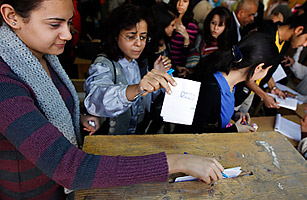
Ahmed is 19 years old, fresh-faced; he sports jeans and a gray “New York” T-shirt and wears his hair gelled back. Like most of his fellow Egyptians, he is young, relatively poor and lives in a dense urban area — specifically Helwan, a sprawling industrial suburb of Cairo dominated by the chimney stacks of nearby cement factories that leave the air thick and gritty. His thumb is stained a bright magenta, a sign that he has just voted — for the first time in his life. And like most Egyptians, he approved the amendments to the constitution that were put to a popular referendum on Saturday. For him, that yes vote was an endorsement of the revolution he participated in, occupying Tahrir Square last month until the only President he has known in his lifetime was forced to decamp.
But this is only one of the many meanings a yes vote in the referendum could have. The majority of the 77.2% that voted yes probably did so because they understood it as a vote for stability, a return to normalcy after the biggest political upheaval in decades. A no result would have been a challenge to the military now ruling the country, which could have either imposed the amendments anyway by decree or entered into protracted negotiations with a political landscape still in gestation. For others, including radical activists, a yes vote meant pushing the military back into its barracks as quickly as possible.